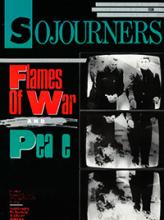What you hear in the whispers, proclaim from the housetops.
--Matthew 10:27
In a refugee camp in El Salvador, I heard the whispers of the poor. Such whispers were nearly overcome by the thuds of nearby bombing and machine-gun fire. But still an audible whisper could be discerned: "Tell your people this: Send bread not bombs. We have too many wives without husbands, too many children without parents."
In the hush of the evening, the whispers of Christians serving the persecuted in Guatemala spoke of the threats waged against them for expressing solidarity with the poor. The whispers of a Nicaraguan mother relayed her love for her beloved son, kidnapped by the contras, and her forgiveness for her persecutors.
The setting for such exchanges had been brutal: injustice, rampant poverty, persecution from every direction, war and death, literally all around us. And yet, and yet: the whispers! What I heard whispered under the breath was an invitation to love, to share in peace of heart. The presence of this peace was given in shared powerlessness, nonviolent love, gentle resistance, and humble service for one another. Peace reigned in the heart; the word was out, a quiet whisper amid the turmoil of war.
The whispers of the poor taught me how to proclaim from the housetops--softly, simply, without clinging to power. Softly, steadily, I shared the good news: "The poor of Central America have forgiven us. We can stop the bombings in El Salvador, the military support of oppressive powers, the violence against the Nicaraguan people, the death-grip over Honduras. Through love, we can open our eyes and discover sisters and brothers."
Read the Full Article

